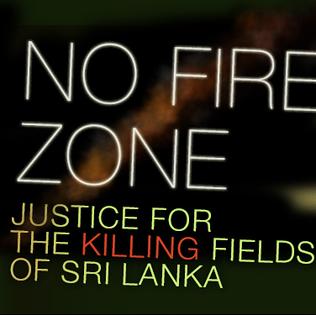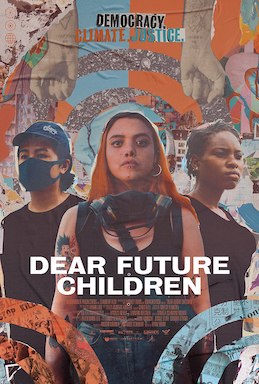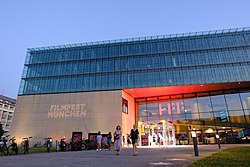
The International Documentary Film Festival Amsterdam (IDFA) is the world's largest documentary film festival held annually since 1988 in Amsterdam, Netherlands.
One World is a human rights film festival, held annually in Prague and other 36 cities of the Czech Republic, with a selection later shown in Brussels and other countries. The festival highlights quality documentary films on social, political, environmental, media and human rights issues. One World presents over a 100 documentary films from all around the globe and organizes numerous Q&As with filmmakers and experts.
Digna... hasta el último aliento is a Mexican film released in 2003.
The UNESCO/Bilbao Prize for the Promotion of a Culture of Human Rights, created in 1978 as the UNESCO Prize for Human Rights Education to mark the 30th anniversary of the adoption of the Universal Declaration of Human Rights, serves to honour the efforts of organizations or individuals that have made an exemplary contribution to the advancement of knowledge on human rights and building a universal culture of human rights. It was renamed on 5 May 2008 under the terms of a memorandum of understanding with Mayor of Bilbao Iñaki Azkuna whereby the municipality of Bilbao agreed to fund the prize for a period of three years.
Waking up the Nation: The Freedom Bus is an Australian documentary film shot in 2002 and internationally released in 2005, directed by Agostino Imondi.

Protection International (PI) is an international non-profit organisation dedicated to the protection of human rights defenders (HRDs). Its stated mission is to offer long-term accompaniment and support human rights defenders at risk by building capacities for managing their protection and security effectively. Protection International takes a preventive and collective perspective of protection instead of the most often reactive perspectives.

Umoja, the Village Where Men Are Forbidden is a French documentary film about the Kenyan village of Umoja, directed by Jean Crousillac and Jean-Marc Sainclair and released in 2009.

Sara Susana del Valle Trimarco de Veron, or Susana Trimarco, is an Argentinian human rights activist, whose efforts to combat human trafficking and corruption have been recognized internationally. After the 2002 disappearance of her daughter, who is believed to have been kidnapped by a human trafficking network, she spent years searching for her daughter, and started a foundation to support victims of sex trafficking. Her lobbying is credited as bringing corruption and government impunity to the fore in Argentina, a discussion which led to a 2011 law banning the advertisement of sexual services in newspapers and magazines.
Cinema Fairbindet, stylised CINEMA Fairbindet and meaning "CINEMA connects", was an award given by Germany's Federal Ministry for Economic Cooperation and Development (BMZ) at the Berlinale between 2011 and 2014.

No Fire Zone: In the Killing Fields of Sri Lanka is an investigative documentary about the final weeks of the Sri Lankan Civil War. The documentary covers the period from September 2008 until the end of the war in 2009 in which thousands of Tamil people were killed by shelling and extrajudicial executions by the Sri Lankan Army including Balachandran Prabhakaran, the 12-year-old son of the slain Liberation Tigers of Tamil Eelam (LTTE) Chief Velupillai Prabhakaran. The Sri Lankan army has denied the allegations in the documentary. However, on 21 October 2015 the BBC reported that Maxwell Paranagama, a government-appointed Sri Lankan judge, says allegations the army committed war crimes during the long conflict with Tamil Tiger rebels are "credible". He went on to say there was evidence to suggest that footage obtained by the Channel 4 documentary No Fire Zone - showing prisoners naked, blindfolded, with arms tied and shot dead by soldiers - was genuine.
The International Film Festival and Forum on Human Rights (FIFDH) is one of the most important international events dedicated to cinema and human rights, held annually in Geneva. A ten-days long event is based on the concept ‘A film, A subject, A debate’, following the screenings with discussion in presence of filmmakers and specialists.

Intersex people in Argentina have no recognition of their rights to physical integrity and bodily autonomy, and no specific protections from discrimination on the basis of sex characteristics. Cases also exist of children being denied access to birth certificates without their parents consenting to medical interventions. The National Institute Against Discrimination, Xenophobia and Racism and civil society organizations such as Justicia Intersex have called for the prohibition of unnecessary medical interventions and access to redress.

Chelo Alvarez-Stehle is a Spanish and American journalist and documentary filmmaker. In Japan, she worked as managing editor for International Press En Español weekly and as Tokyo correspondent for El Mundo daily. As a documentary filmmaker she is best known for Sands of Silence [es], winner of the 59th Southern California Journalism Awards by the Los Angeles Press Club for Best Feature Documentary.
Debasers Filums Ltd is a film and video production company with offices in Edinburgh and Glasgow. The company name is derived from the song Debaser by the band The Pixies, a favourite of Debasers founder Felipe Bustos Sierra; filums is deliberately misspelt.

Dear Future Children is a documentary film directed by Franz Böhm about young activism worldwide. The German-British-Austrian co-production provides insights into the lives of three young activists from Hong Kong, Uganda and Chile and examines the impact on their daily lives. The film premiered on 18 January 2021 at the 42nd Max Ophüls Prize Film Festival, which was held online due to the COVID-19 pandemic.

The DocuDays UA International Human Rights Documentary Film Festival is the only human rights film festival in Ukraine. The festival is held annually at Kyiv in March and admission is free to the general public. Each year, the festival has a different theme, and while not all movies shown adhere to that year's theme, all presented films are documentaries that focus on the subject of human rights.
Asha Ismail is a Kenyan human rights activist. She is the founder and president of Save a Girl, Save a Generation, an organisation whose mission is to end female genital mutilation, the dowry system, forced marriage and other abuses against women in Africa and Asia.

The Addis International Film Festival (AIFF) is an Ethiopian annual film festival organized by Initiative Africa and held in Addis Ababa. Established in 2007, the festival showcases experienced or amateur filmmakers candidate from Ethiopia and Africa, and is one of the largest independent documentary cinema festivals in Africa.











